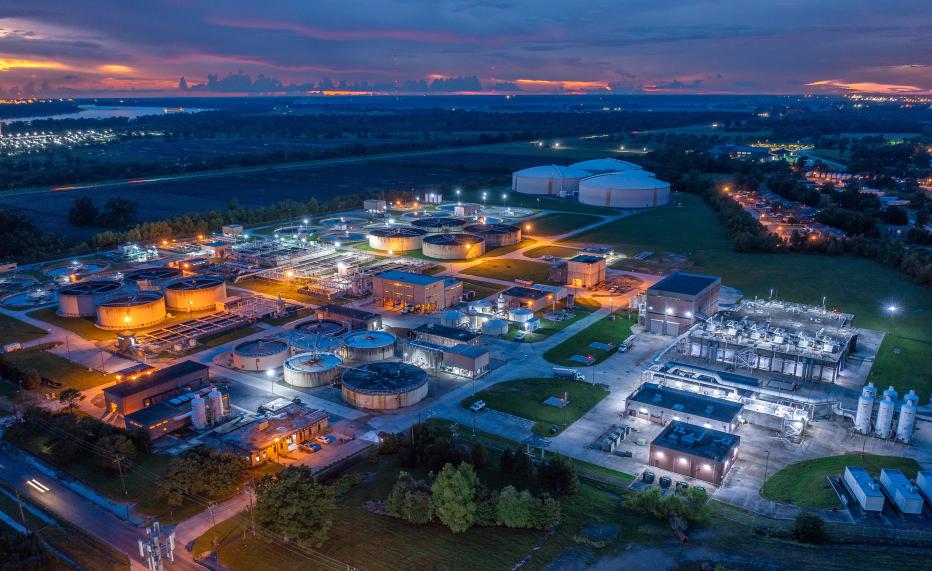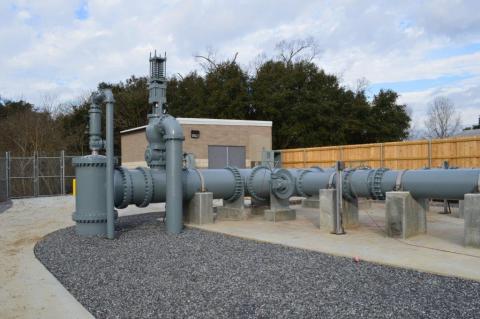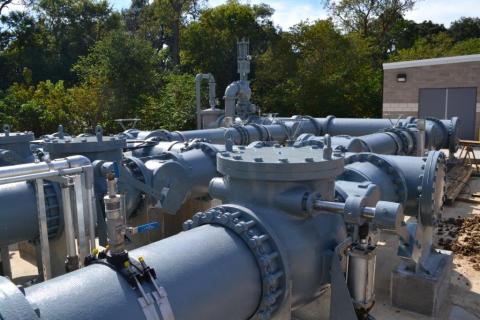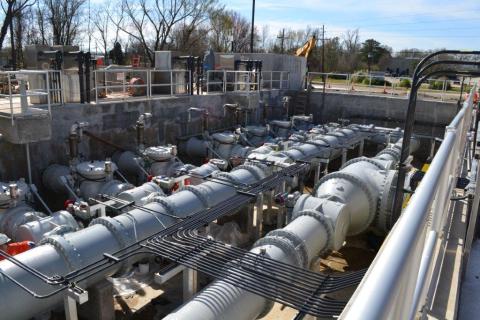
Ariel view of the Baton Rouge Facility
For the past two decades, the City of Baton Rouge and Parish of East Baton Rouge in Louisiana have undertaken major wastewater system upgrades to protect public health and the environment.
In 2002, the City-Parish entered a consent decree with the U.S. federal government to reduce sanitary sewer overflows (SSOs) and maintain permit compliance at the wastewater treatment plants. SSOs occur when blockages, leaks or other defects caused untreated sewage to escape from sewers and pollute local water ways, including the Mississippi River. To meet the requirements of their consent decree, the City-Parish initiated a transformative $1.6 billion wastewater system upgrade in 2006 and contracted Jacobs to manage the 12-year program.
The City-Parish wastewater system spans 10 watersheds and serves over 400,000 residents. The system is divided into two wastewater treatment districts and comprises more than 500 pump stations and over 2,200 miles of separate gravity and pressure sewers. The Baton Rouge SSO program provided a major overhaul of this system. Consisting of 115 individual projects, the program had three objectives: rehabilitate pipelines, increase system capacity and improve wastewater treatment capabilities.
As program manager, Jacobs developed the program delivery plan and oversaw all aspects of the 12-year program, with services including master planning, permitting and regulatory support, design and construction management, utility coordination, land acquisition and public outreach. We delivered the capital program on schedule and under budget and, since 2016, the City-Parish has achieved a nearly 80% reduction in SSO incidents. Based on this successful performance, we’ve continued to support the City-Parish by providing staff augmentation on additional capital projects and operations and maintenance (O&M) management. In 2022 Jacobs was contracted to manage the City-Parish’s stormwater MS4 permit program and in 2023, we were awarded a 10-year O&M contract for their wastewater treatment facilities.
-
$ 1.6 B
Cost of the 12-year Baton Rouge SSO Program
-
1.2 K
Miles of gravity sewer inspected and rehabilitated where needed
-
500
Emergency generators installed
-
160
Pumping stations received capacity improvements
-
$ 112 M
In improvements completed under the Phase II expansion to the South WWTP, the largest capital project in the City-Parish’s history
-
474
Companies involved in the SSO Program, including 122 minority, small, veteran and woman-owned enterprises
SSO solution
The Baton Rouge SSO program involved over 1,200 miles of gravity sewer and over 28,000 manholes being inspected and rehabilitated where necessary to reduce inflow and infiltration, limiting a source of wet weather SSOs. Sewer system modeling identified the areas most in need of rehabilitation, with defects such as collapsed pipe sections and leaking manholes then corrected by local engineers and contractors.
Capacity improvements were made to approximately180 miles of force or gravity sewer and at 160 pumping stations. The capacity upgrades were determined using a hydraulic model of the system to simulate flows under storm events. We maximized in-system storage to reduce the extent of the collection system being upsized and the additional treatment capacity required during wet weather events. Due to this modeling and master planning, we recommended consolidating the Central and South Wastewater Treatment Plants (WWTPs) for a net present worth savings of over $25 million.
Upgrading the South WWTP was one of the most significant undertakings of the Baton Rouge SSO program and marked the largest capital project in City-Parish history. Jacobs leveraged our industry-leading expertise in wastewater treatment to develop an innovative approach in which the trickling filter/solids contact process operates in series during dry weather flow and in parallel during wet weather flow. Upgrades to the South WWTP included a new influent pumping station, new equalization tanks, new headworks, new solids contact basins and new outfall to meet National Pollutant Discharge Elimination System (NPDES) permit requirements.
In 2008, Hurricane Gustav caused power outages throughout much of the City-Parish for nearly a week. During this time, the collection system was not able to convey flows to the WWTPs due to lack of power at the pump stations in the system, and the WWTPs were not able to operate. To address this issue and the prevalence of storms, the City-Parish installed emergency generators at the South WWTP, the North WWTP and all the pump stations in the collection system. The emergency generators are managed by the Supervisory Control and Data Acquisition (SCADA) system that also remotely monitors and controls the pump stations as well as the treatment plants.
As part of the SSO Program, Jacobs created a website registry to assist in the development and growth of local, minority, small, veteran and woman-owned enterprises. It allowed businesses to submit a profile that includes information about their specialties and capabilities. These business profiles were then provided to prime contractors and engineering firms that bid on SSO Program projects.
“Our work with the City of Baton Rouge and Parish of East Baton Rouge since 2006 is a model for how communities can tackle sewer overflows to protect public health and the environment. Having successfully delivered the SSO program on-time and under budget, we’re continuing to support Baton Rouge with operations and maintenance services and managing additional capital programs to improve the community’s wastewater system.”
-

Pump station 3, a 24 million gallon per day wastewater pump station, was constructed to facilitate the closure of the Central Wastewater Treatment Plant.
-

Pump Station 3, redirecting flows to the newly expanded South Wastewater Treatment Plant.
-

Pump station 514 replaced at 35 million gallon per day wastewater booster pump station with a 92 million gallon per day submersible wastewater pump station to meet future design requirements.













































